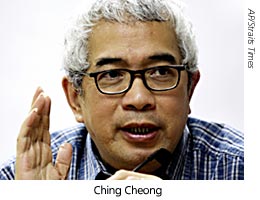New York, August 15, 2006—The Committee to Protect Journalists calls for the release of Straits Times reporter Ching Cheong, who was tried today in a closed-door proceeding in Beijing. His trial on espionage charges began this morning and ended late this afternoon without an immediate verdict, according to Ching’s employer.
“We have seen no evidence that Ching Cheong has committed a crime, and we call for his immediate release” CPJ Executive Director Joel Simon said. “We’re very concerned that Chinese authorities are using the serious and emotional charge of national security as a pretext to close his trial to the public.”
No family members or colleagues were permitted to attend Ching’s trial today at Beijing Second Intermediate People’s Court, Straits Times Foreign Editor Warren Fernandez told CPJ. Ching was represented by a lawyer provided by his employer.
Ching, a Hong Kong citizen, was detained in April 2005 after traveling to mainland China to seek a transcript of interviews with the late ousted leader Zhao Ziyang, his wife Mary Lau has told CPJ. Zhao’s criticism of the government’s actions against pro-democracy demonstrators at Tiananmen Square in 1989 make him a problematic figure for the current administration.
Authorities later charged the journalist with spying, accusing him of accepting large sums of money from the government of Taiwan to set up “channels for espionage” in Hong Kong and Taiwan. State-run Xinhua News Agency reported that he had confessed to his crimes. Ching has not been permitted to speak publicly since his detention.
An espionage conviction can result in life imprisonment.
Singapore Press Holdings, publisher of The Straits Times, released a statement today expressing hope that the trial, which has been postponed several times, would bring an end to his ordeal. “We sincerely hope for the best outcome and will continue to assist him and his family in all possible ways,” the statement said.
The Hong Kong Journalists’ Association held a candlelight vigil tonight in support of Ching, whose imprisonment has been viewed by some as a warning to Hong Kong journalists covering mainland China.
More than 30 journalists are now imprisoned in China, most of them on national security or subversion charges, according to CPJ research.
